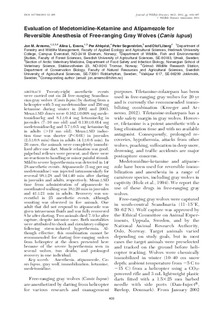Evaluation of Medetomidine-Ketamine and atipamezole for reversible anesthesia of free-ranging gray wolves (Canis lupus)
Journal article, Peer reviewed

Åpne
Permanent lenke
http://hdl.handle.net/11250/134536Utgivelsesdato
2013Metadata
Vis full innførselSamlinger
Originalversjon
Arnemo, J. M., Evans, A., Ahlqvist, P., Segerström, P., & Liberg, O. (2013). Evaluation of Medetomidine-Ketamine and Atipamezole for Reversible Anesthesia of Free-ranging Gray Wolves (Canis lupus). Journal of Wildlife Diseases, 49(2), 403-407. doi: http://dx.doi.org10.7589/2011-12-366 10.7589/2011-12-366Sammendrag
Twenty-eight anesthetic events
were carried out on 24 free-ranging Scandinavian
gray wolves (Canis lupus) by darting from a
helicopter with 5 mg medetomidine and 250 mg
ketamine during winter in 2002 and 2003.
Mean6SD doses were 0.16260.008 mg medetomidine/
kg and 8.160.4 mg ketamine/kg in
juveniles (7–10 mo old) and 0.11060.014 mg
medetomidine/kg and 5.760.5 mg ketamine/kg
in adults (.19 mo old). Mean6SD induction
time was shorter (P,0.01) in juveniles
(2.360.8 min) than in adults (4.160.6 min). In
26 cases, the animals were completely immobilized
after one dart. Muscle relaxation was good,
palpebral reflexes were present, and there were
no reactions to handling orminor painful stimuli.
Mild to severe hyperthermia was detected in 14/
28 anesthetic events. Atipamezole (5 mg per mg
medetomidine) was injected intramuscularly for
reversal 98628 and 94640 min after darting
in juveniles and adults, respectively. Mean6SD
time from administration of atipamezole to
coordinated walking was 38620 min in juveniles
and 41621 min in adults. Recovery was uneventful
in 25 anesthetic events, although
vomiting was observed in five animals. One
adult that did not respond to atipamezole was
given intravenous fluids and was fully recovered
8 hr after darting. Two animals died 7–9 hr after
capture, despite intensive care. Both mortalities
were attributed to shock and circulatory collapse
following stress-induced hyperthermia. Although
effective, this combination cannot be
recommended for darting free-ranging wolves
from helicopter at the doses presented here
because of the severe hyperthermia seen in
several wolves, two deaths, and prolonged
recovery in one individual.
Beskrivelse
This article is published in Journal of Wildlife Diseases, 49(2), 2013, pp. 403–407